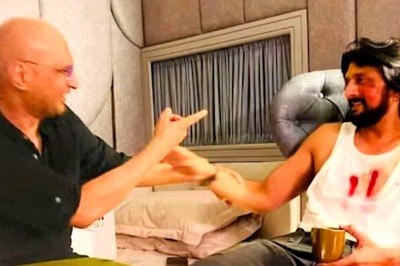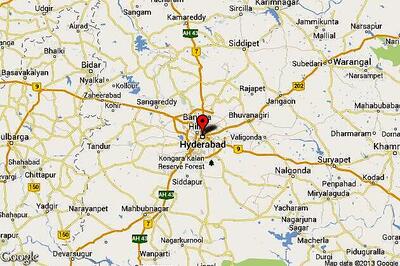
views
And yet, a legal notice is one thing. Physical violence is quite another. So when our car was burnt in the heart of Lucknow last week and the driver beaten up, within days of our telecasting a story on Mayawati's assets and only a week after we had exposed a UP minister from the ruling Samajwadi party on tape, forcing his resignation, one had to be worried. Worried not just for the security of our employees, but also because what happened to CNN-IBN fits in with a pattern across the country where those in power increasingly resort to violence as a means to express themselves. It could be the Shiv Sena's goons in Mumbai one day, Jayalalitha's followers in Chennai the next, the CPI (M)'s cadres in West Bengal a third. Intolerance knows no ideology or party affiliation, and intolerance is spreading. Someone told me that we were being melodramatic in focussing on the Lucknow incident. Outraged yes, melodramatic not quite. Yes, one does feel quite strongly that journalists must stand up and make their voices heard every time the profession is attacked. The defence of freedom of expression ( a concept which still is remarkably well-preserved in the country despite all the pressures of the system) is I believe at the core of this profession. Take away the freedom to speak out, and you are reduced to being a stenographer, or a propagandist. Unfortunately, there is now a growing tendency among those in power to either seduce or intimidate journalists. The seduction comes in various forms, from an invitation to dinner to a Rajya Sabha membership. The intimidation is more direct, and is no longer limited to the mildly threatening phone call. After all, a number of political parties are married to the mob, so one signal from the mob leader is enough to send the cadres on a rampage. This is precisely what happened in Lucknow in what was clearly a pre-planned attack. The aim was clear: you criticise us with a camera, we'll hit back with an iron rod.
So is there hope? Yes, there is. The journalists of Lucknow have responded with a great collective spirit and have demanded a full-fledged inquiry, not just to catch those who were out on the street, but also those who remote control such operations from the safety of their bungalows. Maybe, we will never know who did it ( do we ever really catch the culprits), but atleast the show of strength by journalists is heartening. Many years ago, my friend Nikhil Wagle was the subject of a similar attack by the Shiv Sainiks. We all knew who had done it, we all protested outside Sena Bhavan, but in the end, no senior leader of the party was touched. We even considered boycotting the Thackerays, but frankly, I am uncomfortable with the idea of boycotting public figures, so much better to stick with the story and expose them further. Let me also say that we don't expect anything from Mulayam and Mayawati. But the inevitable cynicism cannot be a reason for us not to make our voices heard. Which is why I am glad that several channels thought it fit to highlight what had happened in Lucknow. It showed that there are still enough people in the media today who are able to look at the big picture, and don't see an attack on one channel as "that" channel's problem, but see it as a problem confronting us all.
In these days of mindless competition, journalism is being inanely projected as a "war for news" when really it should be seen as a triumph of information. A strong, united, robust media is necessary to build a healthy democracy. It would be a shame if our competitive spirit diluted the larger purpose of journalism. About the AuthorRajdeep Sardesai Rajdeep Sardesai was the Editor-in-Chief, IBN18 Network, that includes CNN-IBN, IBN 7 and IBN Lokmat. He has covered some of the biggest stories in I...Read Morefirst published:March 13, 2006, 19:53 ISTlast updated:March 13, 2006, 19:53 IST
window._taboola = window._taboola || [];_taboola.push({mode: 'thumbnails-mid-article',container: 'taboola-mid-article-thumbnails',placement: 'Mid Article Thumbnails',target_type: 'mix'});
let eventFire = false;
window.addEventListener('scroll', () => {
if (window.taboolaInt && !eventFire) {
setTimeout(() => {
ga('send', 'event', 'Mid Article Thumbnails', 'PV');
ga('set', 'dimension22', "Taboola Yes");
}, 4000);
eventFire = true;
}
});
window._taboola = window._taboola || [];_taboola.push({mode: 'thumbnails-a', container: 'taboola-below-article-thumbnails', placement: 'Below Article Thumbnails', target_type: 'mix' });Latest News
An editor once told me that he believed his magazine had "arrived" the day two legal notices were slapped against it (no, we're not referring to the editor of Maxim but someone who prides himself on "serious" journalism). By that reckoning, CNN-IBN has well and truly arrived. So far, we have received three legal notices, each one received with a mix of concern and unconcealed glee.. Lets be honest: journalists thrive on "confrontation", especially if they've got their facts right. We don't mind if you hate or love us, we don't want you to be indifferent to us.
And yet, a legal notice is one thing. Physical violence is quite another. So when our car was burnt in the heart of Lucknow last week and the driver beaten up, within days of our telecasting a story on Mayawati's assets and only a week after we had exposed a UP minister from the ruling Samajwadi party on tape, forcing his resignation, one had to be worried. Worried not just for the security of our employees, but also because what happened to CNN-IBN fits in with a pattern across the country where those in power increasingly resort to violence as a means to express themselves. It could be the Shiv Sena's goons in Mumbai one day, Jayalalitha's followers in Chennai the next, the CPI (M)'s cadres in West Bengal a third. Intolerance knows no ideology or party affiliation, and intolerance is spreading. Someone told me that we were being melodramatic in focussing on the Lucknow incident. Outraged yes, melodramatic not quite. Yes, one does feel quite strongly that journalists must stand up and make their voices heard every time the profession is attacked. The defence of freedom of expression ( a concept which still is remarkably well-preserved in the country despite all the pressures of the system) is I believe at the core of this profession. Take away the freedom to speak out, and you are reduced to being a stenographer, or a propagandist. Unfortunately, there is now a growing tendency among those in power to either seduce or intimidate journalists. The seduction comes in various forms, from an invitation to dinner to a Rajya Sabha membership. The intimidation is more direct, and is no longer limited to the mildly threatening phone call. After all, a number of political parties are married to the mob, so one signal from the mob leader is enough to send the cadres on a rampage. This is precisely what happened in Lucknow in what was clearly a pre-planned attack. The aim was clear: you criticise us with a camera, we'll hit back with an iron rod.
So is there hope? Yes, there is. The journalists of Lucknow have responded with a great collective spirit and have demanded a full-fledged inquiry, not just to catch those who were out on the street, but also those who remote control such operations from the safety of their bungalows. Maybe, we will never know who did it ( do we ever really catch the culprits), but atleast the show of strength by journalists is heartening. Many years ago, my friend Nikhil Wagle was the subject of a similar attack by the Shiv Sainiks. We all knew who had done it, we all protested outside Sena Bhavan, but in the end, no senior leader of the party was touched. We even considered boycotting the Thackerays, but frankly, I am uncomfortable with the idea of boycotting public figures, so much better to stick with the story and expose them further. Let me also say that we don't expect anything from Mulayam and Mayawati. But the inevitable cynicism cannot be a reason for us not to make our voices heard. Which is why I am glad that several channels thought it fit to highlight what had happened in Lucknow. It showed that there are still enough people in the media today who are able to look at the big picture, and don't see an attack on one channel as "that" channel's problem, but see it as a problem confronting us all.
In these days of mindless competition, journalism is being inanely projected as a "war for news" when really it should be seen as a triumph of information. A strong, united, robust media is necessary to build a healthy democracy. It would be a shame if our competitive spirit diluted the larger purpose of journalism.


















Comments
0 comment